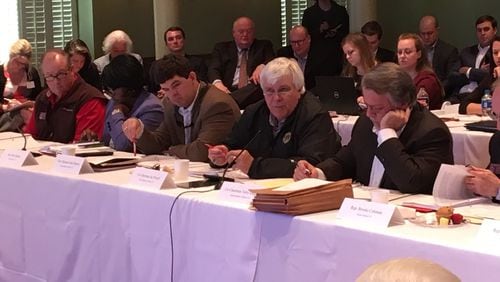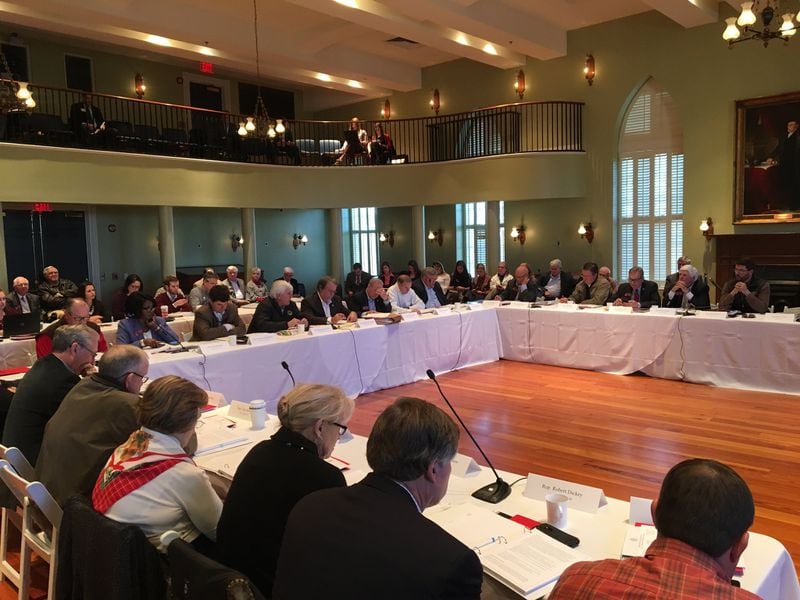A powerful group of state lawmakers approved sweeping proposals Wednesday designed to encourage people and businesses to move to rural Georgia.
The group voted unanimously to support income tax breaks worth up to $6,000 a year, high-speed internet lines in unconnected areas and better health care access.
The recommendations of the Georgia House of Representatives Rural Development Council could become a reality if enacted by the state Legislature next year. House Speaker David Ralston, R-Blue Ridge, said the council's initiatives are a high priority as lawmakers try to bolster far-reaching stretches of the state.
The efforts are focused on counties losing population and jobs to cities, leaving behind areas with few prospects for economic growth. Of Georgia's 159 counties, 124 of them had less than 5 percent population growth for five straight years.
“The problems of rural Georgia won’t wait. We’ve got to get to work on them,” Ralston said after addressing the council at Georgia’s Old Capitol Building in Milledgeville, where the Legislature was located until moving to Atlanta in 1868.
The ambitious effort is meant to upgrade the state's sparsely populated regions so that more jobs will be available, reducing the economic need for locals to move to cities. To encourage businesses to relocate to rural areas, lawmakers say they intend to improve internet service, education and health.
Among the council’s recommendations:
- An income tax deduction worth up to $3,000 a year for anyone who moves to a rural area. The tax break would double in counties that also give real estate property tax discounts for new residents. The group did not say how much it might cost the state.
- State funding for internet companies to offer high-speed service in underserved areas. About 16 percent of Georgians lack access to broadband internet.
- Establishment of a Center for Rural Prosperity and Innovations, possibly at Abraham Baldwin Agricultural College in Tifton, to assist communities in recruiting businesses and identifying growth areas.
- Elimination of the state's Certificate of Need regulation for hospitals in populated areas with many health care options, while keeping rules in effect for rural areas, where hospitals are struggling to survive. That would do nothing new for rural hospitals because they already are covered by the state's CON law, the regulation that restricts private companies' ability to cherry-pick the profitable functions of hospitals.
The costs of these proposals won’t be made clear until specific bills are introduced and evaluated.
Issues such as the Certificate of Need proposal could be contentious during the 2018 session of the Georgia General Assembly, which starts Jan. 8.
“It’s time we look at things that we’ve left alone and not touched it for a number of years,” said state Rep. Terry England, R-Auburn, a co-chairman of the council. “We realize there’s a need in the state to protect our rural hospitals, but at the same time that’s become extremely burdensome to some other parts of the state.”
The council recommended several ways to extend high-speed internet access to rural areas.
The state could establish a “reverse auction” among internet providers, who would submit bids for how much they could pay to provide service to an area, with taxpayers making up the difference between what the highest bidding company could afford and what internet lines actually cost. Other broadband efforts include standardized fees charged by power companies for internet providers to attach to their poles and a consistent telecommunications tax rate for all providers of the same service, including satellite providers.
High-speed internet is a critical step toward growth in rural areas because without it, businesses and residents might move elsewhere, said state Rep. Patty Bentley, D-Butler.
“You need access to broadband to make all of it work,” Bentley said. “Having access to internet is very critical to attracting industry into your communities.”
None of the proposals is set in stone, and they could be changed through the legislative process.
But the recommendations issued Wednesday are a starting point, and Ralston asked the council’s 26 members to act as ambassadors to build support for the efforts among their colleagues.
Alone, none of the initiatives will make a significant difference in the quality of life in rural Georgia, said state Rep. Jay Powell, a co-chairman of the council. But together, the combination of a professional workforce, fast internet and health care access would create the conditions for business growth, he said.
Powell, who is chairman of the tax-writing House Ways and Means Committee, said the income tax breaks come in the form of deductions that would mostly help people with higher incomes such as doctors and business owners, but they’re the type of leaders that struggling communities need.
“You’re talking about people who are going to be providing services, paying sales taxes, buying property and investing in the community,” said Powell, R-Camilla. “I would think the rural broadband would not be controversial. Giving tax credits for folks to move to a location might be.”
House Rural Development Council recommendations
- Income tax breaks worth up to $6,000 a year for residents who move to rural areas
- State funding to supplement internet providers' construction costs in rural areas
- Creation of a Center for Rural Prosperity and Innovations to coordinate economic development
- Additional state funding for education of children from birth to 5 years old
- An easing of regulations on billing by health care providers
- Elimination of Certificates of Need for hospitals in service areas with more than 85,000 residents
Never miss a minute of what’s happening in Georgia Politics. Subscribe to PoliticallyGeorgia.com.
About the Author








